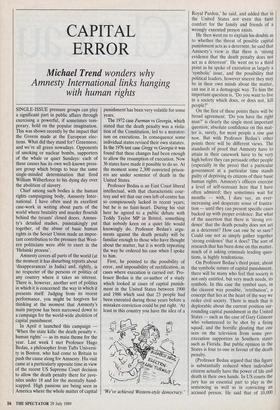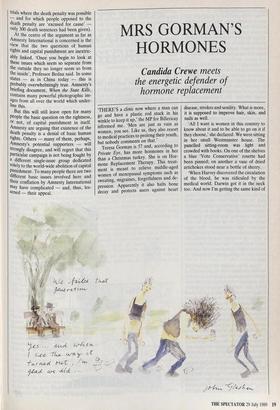CAPITAL ERROR
Michael Trend wonders why
Amnesty International links hanging with human rights
SINGLE-ISSUE pressure groups can play a significant part in public affairs through exercising a powerful, if sometimes tem- porary, hold on the popular imagination. This was shown recently by the impact that the Greens made at the European elec- tions. What did they stand for? Greenness; and we're all green nowadays. Opponents of smoking or nuclear bombs, supporters of the whale or quiet Sundays: each of these causes has its own well-known press- ure group which brings to bear the same single-minded determination that fired William Wilberforce to his dying day over the abolition of slavery.
Chief among such bodies is the human rights campaigning body, Amnesty Inter- national. I have often used its excellent case-work in writing about parts of the world where brutality and murder flourish behind the tyrants' closed doors. Amnes- ty's detailed studies, painstakingly put together, of the abuse of basic human rights in the Soviet Union made an impor- tant contribution to the pressure that West- ern politicians were able to exert in the 'Helsinki process'.
Amnesty covers all parts of the world (at the moment it has disturbing reports about 'disappearances' in India) and, rightly, is no respecter of the persons or politics of any country where it takes an interest. There is, however, another sort of politics in which it is concerned: the way in which it presents itself. Judging from its recent performance, you might be forgiven for thinking at the moment that Amnesty's main purpose has been narrowed down to a campaign for the world-wide abolition of capital punishment.
In April it launched this campaign — 'When the state kills: the death penalty v. human rights' — as its main theme for the year. Last week I met Professor Hugo Bedau, a philosopher from Tufts Universi- ty in Boston, who had come to Britain to push the cause along for Amnesty. His visit came at a particularly apposite time in view of the recent US Supreme Court decision to allow the death penalty there for juve- niles under 18 and for the mentally hand- icapped. High passions are being seen in America where the whole matter of capital punishment has been very volatile for some years.
The 1972 case Furman vs Georgia, which stated that the death penalty was a viola- tion of the Constitution, led to a morator- ium on executions. In consequence some individual states revised their own statutes. In the 1976 test case Gregg vs Georgia it was found that these changes had been enough to allow the resumption of execution. Now 36 states have made it possible to do so. At the moment some 2,300 convicted prison- ers are under sentence of death in the United States.
Professor Bedau is an East Coast liberal intellectual, with that characteristic cour- tesy and wit that our own left-of-centre has so conspicuously lacked in recent years; but he is no faint-heart. During his visit here he agreed to a public debate with Teddy Taylor MP in Bristol, something that nobody keen on a quiet life would knowingly do. Professor Bedau's argu- ments against the death penalty will be familiar enough to those who have thought about the matter, but it is worth repeating the way he ordered his case when I spoke to him.
First, he pointed to the possibility of error, and impossibility of rectification, in cases where execution is carried out. Pro- fessor Bedau is the co-author of a study which looked at cases of capital punish- ment in the United States between 1900 and 1986 which said that 23 people had been executed during those years before a mistaken conviction could be put right. 'At least in this country you have the idea of a 'We've achieved Western-style democracy.' Royal Pardon,' he said, and added that in the United States not even this faint comfort for the family and friends of a wrongly executed person exists.
He then went on to explain his doubts as to whether the threat of possible capital punishment acts as a deterrent; he said that Amnesty's view is that there is 'strong evidence that the death penalty does not act as a deterrent'. He went on to a third point as he spoke of execution as largely a 'symbolic' issue, and the possibility that political leaders, however sincere they may be in their own minds about the matter, can use it in a demagogic way. To him the important question is, 'Do you want to live in a society which does, or does not, kill people?'
On the first of these points there will be broad agreement. 'Do you have the right man?' is clearly the single most important question; absolute confidence on this mat- ter is, surely, for most people a sine qua non. But with Professor Bedau's other points there will be different views. The standards of proof that Amnesty have to attain in their casework have to be very high before they can persuade other people (especially in the press) that a particular government at a particular time stands guilty of depriving its citizens of their basic human rights. Amnesty's officers exercise a level of self-restraint here that I have often admired; they sometimes wait for months — with, I dare say, an ever- increasing and desperate sense of frustra- tion — until they can present specific cases backed up with proper evidence. But what of the assertion that there is 'strong evi- dence' that the death penalty does not act as a deterrent? How can one be so sure? Could one not as simply gather together 'strong evidence' that it does? The sort of research that has been done on this matter, much of it asking criminals leading ques- tions, is highly tendentious.
On Professor Bedau's third point, about the symbolic nature of capital punishment, there will be many who feel that society is not only entitled, but very much needs, its symbols. In this case the symbol says, in the clearest way possible, 'retribution', a concept that lies at the heart of the way we order civil society. There is much that is deplorable about the current position sur- rounding capital punishment in the United States — such as the case of Gary Gilmore who volunteered to be shot by a firing squad, and the horrific gloating that one sees on the television from some pro- execution supporters in Southern states such as Florida. But public opinion in the States is four to one in favour of the death penalty.
(Professor Bedau argued that this figure is substantially reduced when individual citizens actually have the power of life and death in their own hands. In US courts the jury has an essential part to play in the sentencing as well as in convicting an accused person. He said that of 10,000 trials where the death penalty was possible — and for which people opposed to the death penalty are 'excused for cause' — only 300 death sentences had been given). At the centre of the argument as far as Amnesty International is concerned is the view that the two questions of human rights and capital punishment are inextric- ably linked. 'Once you begin to look at these issues which seem so separate from the outside they no longer seem so from the inside', Professor Bedau said. In some states — as in China today — this is Probably overwhelmingly true. Amnesty's briefing document, When the State Kills, contains many powerful photographic im- ages from all over the world which under- line this.
But this will still leave open for many People the basic question on the rightness, or not, of capital punishment in itself. Amnesty are arguing that existence of the death penalty is a denial of basic human rights. Others — many of them, perhaps, Amnesty's potential supporters — will strongly disagree, and will regret that this particular campaign is not being fought by a different single-issue group dedicated solely to the world-wide abolition of capital Punishment. To many people there are two different basic issues involved here and their conflation by Amnesty International may have complicated — and, thus, les- sened — their appeal.



















































 Previous page
Previous page